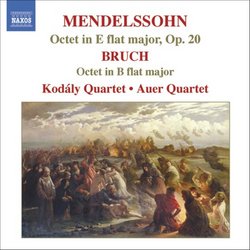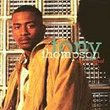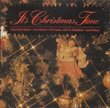| All Artists: Felix [1] Mendelssohn, Max Bruch Title: Mendelssohn: Octet in E flat major, Op. 20; Bruch: Octet in B flat major Members Wishing: 0 Total Copies: 0 Label: Naxos Original Release Date: 1/1/2006 Re-Release Date: 4/18/2006 Genre: Classical Styles: Chamber Music, Historical Periods, Classical (c.1770-1830) Number of Discs: 1 SwapaCD Credits: 1 UPC: 747313227020 |
Search - Felix [1] Mendelssohn, Max Bruch :: Mendelssohn: Octet in E flat major, Op. 20; Bruch: Octet in B flat major
 | Felix [1] Mendelssohn, Max Bruch Mendelssohn: Octet in E flat major, Op. 20; Bruch: Octet in B flat major Genre: Classical
|
Larger Image |
CD DetailsSimilar CDs
|
CD ReviewsTwo Glorious String Octets by Mendelssohn and Bruch J Scott Morrison | Middlebury VT, USA | 05/14/2006 (5 out of 5 stars) "The story of the composition of Mendelssohn's String Octet is fairly well known. Written when he was only sixteen and at the same time as his even more familiar overture to A Midsummer Night's Dream, it is one of the glories of the string chamber music repertoire and introduces us to the quintessentially Mendelssohnian 'fairy music,' that light and bustling sound so identifiably that of this amazing prodigy. There are many recordings of this masterpiece and it would be impossible to single any one out as the most impressive, but this performance by the combined Kodaly and Auer Quartets need not shrink into the shadows. These eight Hungarian musicians recorded the piece in Budapest in 2003 and clearly identified completely with its sound world. Their approach is marked by unanimity of style, ultra-clean articulation (particularly valuable in III and IV) and an obvious love for the music. Listen to the heartfelt performance of the Octet's melting slow movement; this work is not just about glinting fairy lights but also about deep feelings and the musicians convey that fully. The Bruch Octet, Op. posth. (1920) was written only a few months before the composer's death. It was lost after his death and not found and premiered until 1996. It has quickly entered the repertoire. There is a marvelous performance on cpo led by the great violinist Ulf Hoelscher. But this recording is very nearly its equal and has a rather more Mendelssohnian tinge than the cpo version. The work itself sounds as if the talents of Brahms and Mendelssohn had been combined. There is the autumnal late-Brahmsian quality coupled, particularly in the final movement, with Mendelssohnian lightness. Unfailingly melodic, and with sometimes striking harmonic twists and contrapuntal interweavings, the work is clearly a masterpiece. We are indebted to American musicologist Thomas Wood who edited and seamlessly completed the work. (This aspect of the work's history is not mentioned in the otherwise fine booklet notes by Keith Anderson.) Although to some degree modeled on the Mendelssohn Octet, the Bruch differs in that the second cello is replaced by a double bass; it is speculated that he considered the possibility that the octet could thus also be played by a string orchestra. Another difference from the Mendelssohn is that it is only three movements: a Brahmsian slow allegro, a tenderly elegiac Adagio, and the elfin Allegro molto finale. The Kodaly/Auer quartets, plus bassist Szolt Fejervari, play the work with fervor and, again, marvelously clear articulation which is always a problem with a work that has eight independent parts. Sound is quite good. There is a golden glow around the sound but it does not interfere with clarity and balance. At this budget price and with performances this good, this is a clear recommendation, particularly for those who are not familiar with the remarkably satisfying Bruch. Scott Morrison" Classics Today 10-10 DKDC | Washington, DC USA | 05/23/2006 (5 out of 5 stars) "10 for sound and 10 for performance I would add a 10 for price!" Accurate and virtuosic interpretation Scora | California | 07/25/2009 (5 out of 5 stars) "Where the Mendelssohn Octet is concerned, this is the recording to beat. Not do only the members of the Kodaly and Auer quartets synthesize well together, but they are excellent musicians as well, and I am now thinking of getting as many of each of their performances as I can. The Auer quartet is also impressive considering that they are not as well known (At least in the U.S.). The Bruch is also very nice and sunny, although I must say it is something of a sideshow to the amazing Mendelssohn performance. Bravo!"
|

 Track Listings (7) - Disc #1
Track Listings (7) - Disc #1



